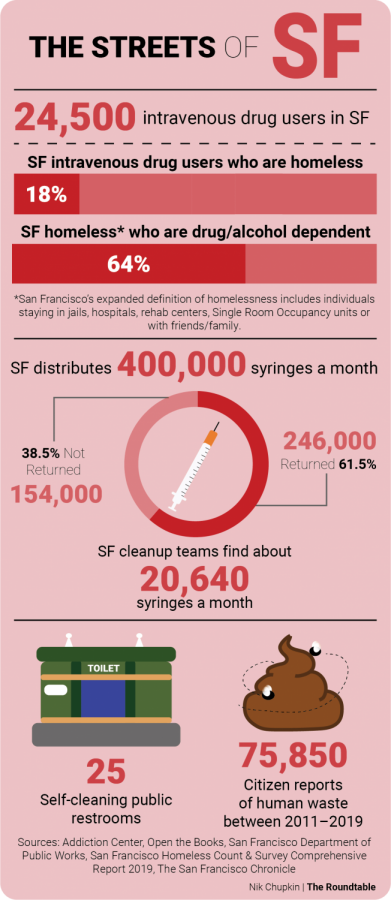Owen’s Opinion
San Francisco needs to implement new cleanup policies
December 12, 2019
 San Francisco embodies the American tech boom, serves as a center of innovation, fosters strong markets and grows neo-progressive ideals, but that doesn’t mean we can ignore its filthy streets. The presence of human waste, used drug paraphernalia, trash and rodents on the streets are all legitimate health risks to San Francisco’s citizens.
San Francisco embodies the American tech boom, serves as a center of innovation, fosters strong markets and grows neo-progressive ideals, but that doesn’t mean we can ignore its filthy streets. The presence of human waste, used drug paraphernalia, trash and rodents on the streets are all legitimate health risks to San Francisco’s citizens.
San Francisco has 24,500 “intravenous drug addicts” and 9,784 homeless, according to the San Francisco Department of Health. The streets are consequently covered in needles, human waste and trash, but the city of San Francisco isn’t doing much to abate this problem. In fact, the city is assisting in defiling the streets.
The San Francisco Health Department hands out over 400,000 needles a month to its 25,000 people who inject drugs, 4,000 of whom are homeless. According to City Journal, about 40% of needles aren’t handed back or disposed of properly.
The needle program was originally instituted to decrease the spread of infectious diseases like HIV, hepatitis and typhus, but by needles ending up on the streets more, it could have devastating impacts — more people who inject drugs will be picking needles off the dirty streets and using them, which could lead to a rise in disease.
While San Francisco has pick-up teams that collect about 12,000 needles a month from homeless encampments alone, according to the “San Francisco Chronicle,” it wouldn’t need these teams if it didn’t hand out needles in the first place. The city subsidizes both the needle program and the cleanup team through taxation.
Families, pets and even homeless people are at risk of being exposed to disease-ridden syringes. NBC Bay Area’s investigation team found over 100 used needles discarded on the downtown San Francisco streets in one day.
If a pet or pedestrian were to step on a needle, they could contract whatever infectious disease the original user may have had. Police officers in Los Angeles have been treated for typhoid fever they contracted while working needle-infested homeless encampments.
As long as San Francisco and other cities use the public’s money to give out free needles to people who inject drugs without collecting them, the streets will pose serious health risks. If San Francisco really wanted to help abate the problem of filthy streets, it would not increase health and safety hazards on the streets by putting more needles into circulation without having a plan for proper disposal. Instead, it would use the money to prevent health hazards like human waste.
San Francisco can easily prevent human waste on the streets by using budgeted money to build public “pit stops.” The city has a shortage of public toilets, with only 25 pit stops — self-cleaning, single-occupant public bathrooms — available in the entire city. This means that thousands of homeless people defecate, urinate and vomit on the streets every single day.
Sixty-five people call the city every day to report stepping in or seeing human waste on sidewalks, according to the Chamber of Commerce. NBC surveyed downtown San Francisco and discovered 300 piles of human feces in one day. Nothing could be more embarrassing for a city the size of San Francisco.
The problem has become so bad that SF Travel, the city’s visitor bureau, set up a hotline for tourists to report feces and needles on the streets. The bureau’s website states that it wants to make San Francisco the ultimate travel destination, and that the streets need to be cleaner for that to happen.
Still, San Francisco only built three new public toilets this year, which are currently not open 24 hours a day, according to CBS Bay Area. No wonder pedestrians step in feces and urine — 9,000 homeless people do not have access to bathrooms at night, and compete for 25 toilets during the day. San Francisco needs to designate more of its massive $12.3 billion budget to building more public bathrooms.
The solution for San Francisco’s streets is simple: stop giving out needles as long as they aren’t properly disposed of and build more public toilets. Doing so would make the streets safer from health hazards for citizens, people who inject drugs and the homeless alike.







